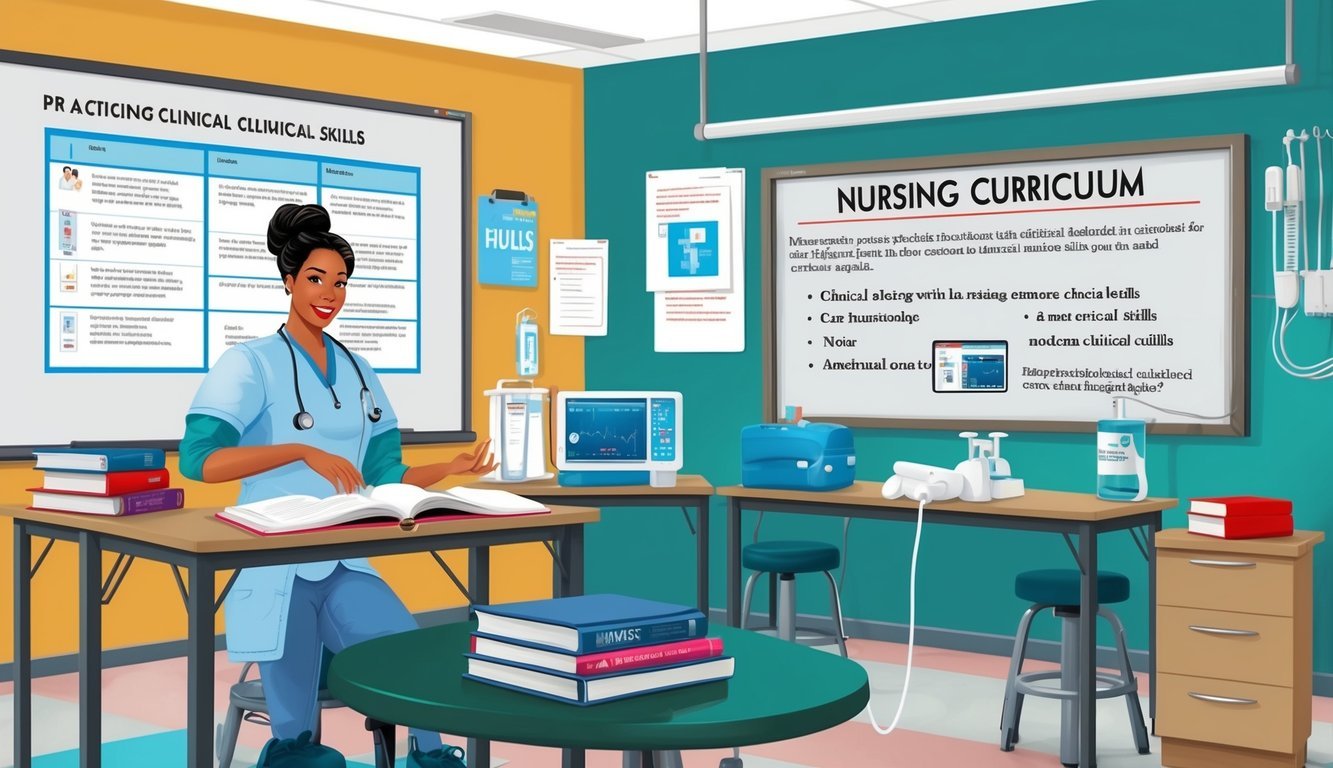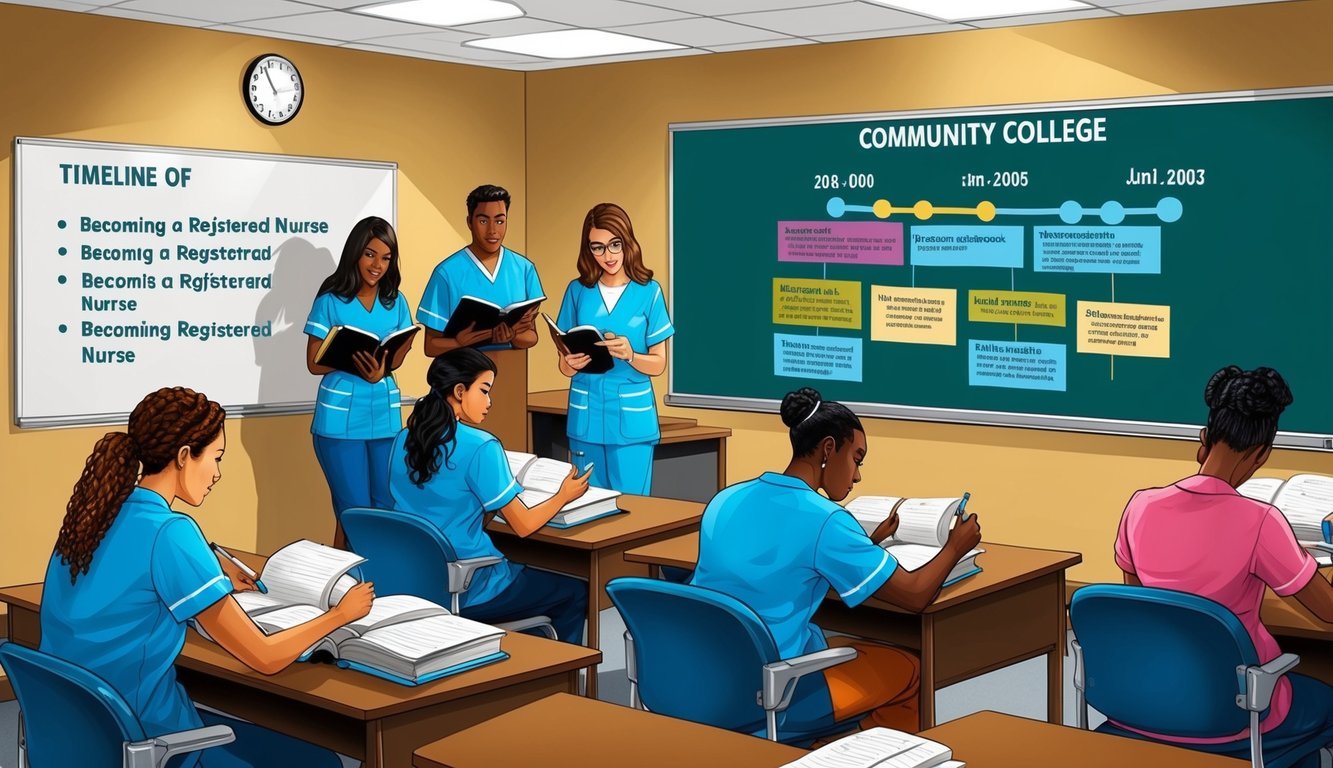Pursuing a career as a registered nurse (RN) is both a rewarding and practical choice for many individuals.
If you’re considering this path through a community college, you probably want to know how long the process will take.
Typically, you can expect to complete an RN program at a community college in two to four years, depending on whether you choose a diploma, associate degree, or other advanced options.
The timeline for becoming an RN varies due to several factors, including the type of program and your previous education or experience.
Community colleges often offer several pathways to nursing, which can influence the overall duration of your studies.
For instance, enrolling in an Associate Degree in Nursing (ADN) usually takes about two years, while a more advanced Bachelor of Science in Nursing (BSN) may require four years of study.
Understanding these timeframes is essential for planning your education and career.
With commitment and the right resources, you can successfully navigate the steps necessary to become a registered nurse.
For detailed insights on program specifics, consider reviewing resources like RNCareers.
Exploring Nursing Programs at Community Colleges
Community colleges offer a variety of nursing programs tailored to different student needs and career objectives.
Understanding the types of programs, admission requirements, and accreditation processes can help you make informed decisions on your educational path.
Types of Nursing Programs
Community colleges typically provide several nursing program options, including the Associate Degree in Nursing (ADN) and Practical Nursing (LPN) programs.
- ADN Program: This program typically takes about two years to complete and prepares you for the NCLEX-RN exam, leading to registered nurse (RN) licensure.
- LPN Program: This program focuses on foundational nursing skills and can often be completed in about one year.
Some institutions may also offer pathways toward a Bachelor of Science in Nursing (BSN) through partnerships with four-year universities.
This could set the stage for advanced career opportunities and higher earning potential.
Admission Requirements
Admission requirements can vary widely among community colleges, but common elements often include:
- High School Diploma or GED: A prerequisite for entering nursing programs.
- Prerequisite Courses: Completion of courses in subjects like biology, chemistry, and anatomy may be necessary for some programs.
- Entrance Tests: Some colleges require nursing entrance exams like the TEAS to assess your readiness.
Typically, applications also demand letters of recommendation and personal statements.
Be sure to check specific requirements for each program you’re considering.
Program Accreditations
Accreditation is crucial for ensuring the quality of your nursing education and can affect your eligibility for financial aid and transfer options.
- ACEN or CCNE Accreditation: Look for programs accredited by recognized organizations such as the Accreditation Commission for Education in Nursing (ACEN) or the Commission on Collegiate Nursing Education (CCNE).
- State Approval: Programs must also be approved by the state nursing board, which regulates nursing practices.
Choosing an accredited program ensures that you receive a quality education and increases your competitiveness in the job market.
Always verify the accreditation status of the program you are interested in.
Curriculum and Clinical Experience

The curriculum for becoming a registered nurse (RN) at a community college combines essential nursing courses with hands-on clinical experience.
This model equips you with the theoretical knowledge needed and the practical skills necessary for effective patient care.
Core Nursing Courses
In your nursing program, core courses form the foundational knowledge for your nursing education.
You will typically study subjects such as:
- Anatomy and Physiology: Understanding body systems is critical for patient assessment and care.
- Pharmacology: Knowledge of medications is crucial for safe administration.
- Nursing Fundamentals: This course covers fundamental nursing skills and patient care principles.
- Health Assessment: You learn to evaluate patients through physical exams and history taking.
These courses often include theoretical lectures combined with lab work to develop your clinical skills.
Mastery of these subjects is essential to progress to more specialized content.
Specialized Clinical Rotations
Clinical rotations are where theory meets practice.
During these experiences, you will rotate through various departments such as:
- Medical-Surgical Units: Gain experience in general patient care.
- Pediatrics: Learn how to care for children with acute and chronic conditions.
- Gerontology: Understand the unique needs of elderly patients.
- Mental Health: Focus on psychological assessment and interventions.
These placements allow you to apply your knowledge in real-world settings, helping you build practical skills under the supervision of experienced RNs.
The integration of clinical experiences is critical for developing your clinical nursing experience.
Supplemental Learning Opportunities
In addition to core courses and clinical rotations, many programs offer supplemental learning opportunities to enhance your education.
These may include:
- Simulations: High-fidelity mannequins provide a safe environment to practice clinical skills.
- Workshops: Skills workshops focus on specific nursing techniques, such as IV insertion or wound care.
- Research Projects: Engaging in research can deepen your understanding of evidence-based practices.
- Peer Tutoring: Collaborating with classmates can solidify understanding of complex subjects.
These additional experiences support your learning and help prepare you for the challenges of a nursing career.
By actively participating in these opportunities, you can develop a comprehensive skill set tailored to the demands of the healthcare field.
Licensure: Preparing for the NCLEX-RN
Becoming a registered nurse (RN) involves successfully completing the NCLEX-RN licensure exam.
This section will provide insights into the exam structure, effective preparation strategies, and essential information about pass rates.
NCLEX-RN Exam Overview
The NCLEX-RN is a computerized adaptive test that measures your knowledge and skills necessary for safe and effective practice as a nurse.
You will answer between 75 to 265 questions, depending on your performance.
Typically, the exam includes various question types, such as multiple-choice, fill-in-the-blank, and select-all-that-apply.
Understanding the test format and content areas, including patient care, safety, and health promotion, is crucial for success.
Familiarize yourself with the regulatory requirements in your state for taking the NCLEX-RN, as they can vary.
Exam Preparation Strategies
Effective preparation for the NCLEX-RN is key to passing the exam.
Start by creating a structured study plan that spans several weeks or months.
Consider using a mix of resources, such as textbooks, online courses, and practice exams.
Here are some effective strategies:
- Study Groups: Collaborate with peers to review content and quiz each other.
- Practice Questions: Use NCLEX-style questions to gauge your knowledge and identify weak areas.
- Review Courses: Consider enrolling in an NCLEX review course for additional guidance.
You may also find that time management plays a significant role in your preparation.
Allocate specific times for studying each day, and take regular breaks to avoid burnout.
Understanding Pass Rates
NCLEX-RN pass rates provide an important perspective on exam preparedness.
As of recent statistics, the national first-time pass rate hovers around 87%, but this can vary by state and nursing program.
It is beneficial to look into the pass rates of your school and the programs you are considering:
| Program Type | Pass Rate (%) |
|---|---|
| ADN Programs | 85.0 |
| BSN Programs | 90.8 |
| NCLEX-PN | 83.0 |
High pass rates often indicate quality instruction and effective preparation strategies that you can leverage.
Checking your school’s previous NCLEX-RN performance can provide insights into the support you will receive during your studies.
Advancing From RN to BSN
Transitioning from a registered nurse (RN) to a Bachelor of Science in Nursing (BSN) opens new pathways for your career.
This advancement can enhance your skills, expand your job opportunities, and potentially increase your salary.
RN to BSN Program Options
Many community colleges and universities offer RN-to-BSN programs tailored for active nurses.
These programs can typically be completed in 12 to 24 months, depending on your prior education and the number of credits you can transfer.
Online options are widely available, allowing for flexibility in scheduling.
You may encounter a mix of coursework that includes healthcare policy, nursing research, and clinical leadership.
Here is a brief overview of common program formats:
| Program Type | Duration | Format |
|---|---|---|
| Full-Time | 1 year | Online/On-campus |
| Part-Time | 2 years | Online/On-campus |
| Accelerated Programs | 12 months | Online |
Explore programs that align with your career goals to find the best fit for your needs.
Benefits of Earning a BSN
Obtaining a BSN degree provides several advantages.
It enhances your clinical decision-making abilities and leadership skills, preparing you for advanced roles in healthcare.
Research indicates that hospitals with a higher percentage of BSN-prepared nurses often have better patient outcomes.
Many employers now preference or require a BSN, making it a valuable asset in a competitive job market.
Additional benefits include:
- Increased Earning Potential: BSN nurses often earn higher salaries than those with only an associate degree.
- Career Advancement: A BSN can pave the way for leadership positions and specialized fields.
- Improved Job Security: The demand for BSN-prepared nurses is rising, providing greater job stability.
By pursuing an RN-to-BSN program, you position yourself for continued success in the evolving healthcare landscape.
Career Outlook for Registered Nurses

The career outlook for registered nurses (RNs) is promising, characterized by diverse job opportunities and a strong demand for skilled professionals.
You will find various settings to work in and paths to pursue, ensuring a dynamic nursing career with room for growth.
Job Opportunities and Settings
As a registered nurse, you can explore numerous job opportunities across various healthcare settings.
These include:
- Hospitals: The most common workplace for RNs, where you may work in critical care, surgery, or emergency departments.
- Long-Term Care Facilities: Options such as nursing homes and rehabilitation centers where you cater to chronic patients.
- Outpatient Clinics: Manage patients who require ongoing care without hospitalization.
- Home Health Care: Provide personalized care to patients in their homes, frequently ensuring comfort for those with mobility issues.
- Nursing Education: Opportunities to teach future nurses, contributing to the next generation.
Each setting offers unique experiences and challenges, allowing you to tailor your career path based on your interests and skills.
Continuing Education and Specializations
Continuing education is vital to advancing your nursing career.
Registered nurses can pursue various specializations to enhance their skills and marketability.
Some popular paths include:
- Nurse Practitioner (NP): An advanced practice role that requires additional training and certification, allowing for greater autonomy and the ability to diagnose patients.
- Clinical Nurse Specialist (CNS): Focus on specific areas like cardiology or oncology, providing expert care and leadership.
- Nursing Administration: Lead healthcare teams and manage operations within hospitals or clinics.
You may also consider certifications in areas like critical care or pediatrics to further distinguish yourself in the job market.
Organizations like the American Nurses Association offer resources for continuing education.
Impact of Education on Job Security
Your level of education significantly impacts job security in nursing.
The federal government projects a demand for over 203,000 new registered nurse positions annually through 2031.
Higher educational credentials typically lead to more job opportunities and better roles.
- Associate Degree in Nursing (ADN): Prepares you for entry-level positions, but may limit advancement.
- Bachelor of Science in Nursing (BSN): Preferred in most hospitals and offers better job prospects.
- Master’s and Doctorate Degrees: Open doors to administrative and specialized roles, enhancing job security.
Investing in your education not only increases your employability, but also positions you to meet evolving healthcare demands.

